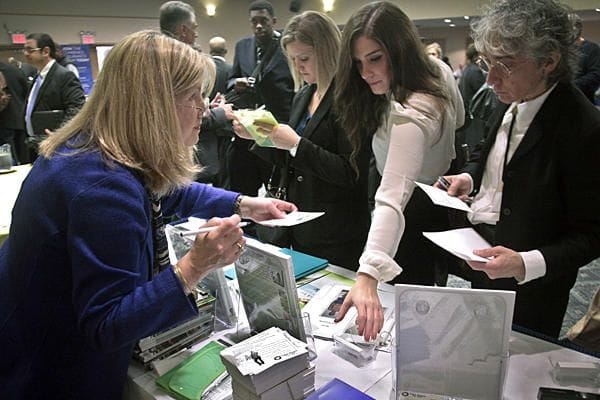November Jobs Report Better Than Expected, Focus Still on Fiscal Cliff

Credit: AP

The US private sector added 146,000 jobs in November, according to a report released by the US Department of Labor on Friday. The unemployment rate dropped 0.2 percent to 7.7 percent.
Economists and analysts predicted job growth would be around 80,000 because of Hurricane Sandy and while 146,000 jobs is usually considered by most to be underwhelming, it came as a surprise to many. According to the labor department, the storm wasn’t much of a variable in the employment numbers:
“Our analysis leads us to conclude that Hurricane Sandy did not substantially impact the national employment and unemployment estimates for November.”
The majority of the job growth was in retail, professional services, and leisure and hospitality. This is expected during one of the busiest times of the year for consumer spending and traveling. Employment in construction and manufacturing, however, fell last month.
November’s unemployment rate dropped to 7.7 percent, the lowest it has been since 2008. Economists expected the unemployment rate to remain steady at 7.9 percent or even rise to eight percent. The surprising decline is due mostly to the fact that 350,000 people left the workforce completely. These are individuals who have given up on finding a job in a slow-to-recover economy.
Job growth remains steady at the moment, which is both good and bad news. It is a good thing because the labor market is not slipping, but it also means job growth is still not where it needs to be to keep pace with population growth and job creators are looking ahead at a problem that has dominated the national dialogue since the end of the elections: the "fiscal cliff." Employers have said they are waiting to see what happens in Washington before they start adding additional people to their payrolls.
Republicans and Democrats, however, are looking for the spin to use the jobs report in their favor in the ongoing debate over spending cuts and generating revenue. The White House argues that continued growth in the labor market is a sign that the fiscal policies of the Obama administration are working.
“While more work remains to be done, today’s employment report provides further evidence that the U.S. economy is continuing to heal from the wounds inflicted by the worst downturn since the Great Depression,” Alan Kruegar, Chairman of President Obama’s Council of Economic Advisors, wrote on the White House blog. “It is critical that we continue the policies that are building an economy that works for the middle class as we dig our way out of the deep hole that was caused by the severe recession that began in December 2007.”
US House Speaker John Boehner, however, had his own take on the current unemployment situation. He blames the president’s tax proposals for the slow economic growth:
Republicans passed bipartisan legislation stopping the tax hikes and replacing the defense sequester to avert the fiscal cliff; Senate Democrats talked openly about driving off of it. And while the president insists on raising small businesses’ tax rates instead of cutting spending, small business hiring plans have plummeted. That takes jobs away from the American people at the very time small businesses are struggling to create them.
It seems if Republican and Democratic lawmakers wanted to see real improvement in the labor market they would make greater efforts at finding compromise to deal with a problem that is expected to affect all areas of the US economy. However, with twenty-five days left before roughly a trillion dollars in automatic spending cuts begin to take effect and tax cuts expire for about ninety percent of American households, there are no signs of real progress in the negotiations



